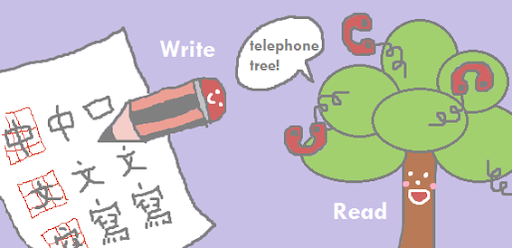
Above: Copybook can be used to improve children's Chinese writing skill while games in morphological awareness can be used to improve children's Chinese reading skill.
Are the processes of learning to read and to write Chinese words the same or different? How?
We have carried out some studies to identify the differences of learning to read and write at the beginning stage. We considered the idea that thinking skills (reasoning), language skills (like children's abilities to understand the meanings of new words), and visuo-motor skills (e.g., how well they hold a pencil and copy something unfamiliar) might all be important for learning to read and to write.
To young children, Chinese reading is the process of linking the sounds to the print forms of characters. They learn the whole characters when they begin to read Chinese. On the other hand, Chinese writing is a process of converting oral language to visually complex forms. Children need to learn to write each stroke according to the structure of the characters. Therefore, our research team suspected that learning to read and write Chinese might involve different mental processes and unique skills. Wang, McBride-Chang and Chan found that three skills were particularly strongly related to Chinese word reading in Chinese kindergartners in Mainland China. These were morphological awareness, speeded naming, and Pinyin knowledge. Morphological awareness here refers to how well a child could manipulate morphemes, or the smallest units of language, in language games. An example is asking the child to solve a "riddle" of sorts, something like "What do we call a tree that grows telephones? A telephone tree!" Asking children to answer such questions about made up concepts helps children to improve their focus on meaning in language. Tasks of speeded naming require children to say some visually presented stimuli aloud as quickly as possible. What is of interest in this test is that some children who can name the stimuli (such as numbers or color blocks or common objects) most quickly tend to be better readers. In contrast, researchers found that only "pure" copying skill (i.e., how well a Chinese child could copy unfamiliar funny visual shapes like Korean or Hebrew words, which the children had never seen) was related to Chinese writing in kindergartners. A follow-up study showed similar findings and further demonstrated that children’s performances in Chinese word reading and writing were not related when they were at age 5 but became strongly related when they were tested one year later. These results show some differences in word reading and word writing in young children.
From these studies, we understand that there are rapid changes in early Chinese word reading and word writing development. What are the practical implications of these findings? Parents and teachers should particularly encourage children to write in copybooks in order to improve their writing skills but provide practice in morphological awareness and vocabulary games when focusing on their Chinese reading skills. With development, children’s reading and writing abilities might affect each other. Automatic writing of learned characters may facilitate children’s learning and memorization of new characters. Children can then practice writing new characters at a later stage. This practice may help children to better prepare for both word recognition and word writing, skills that overlap but are not the same, in school.
For examples of morphological awareness and vocabulary games, you may look up the “learning implication” section in our website (e.g. lexical compounding – morpheme chains and create word lists with common characters).
This article was written by our guest blogger Dr. WANG, Ying. Dr. Wang is currently a post-doctoral fellow of the Division of Learning, Development and Diversity in the University of Hong Kong. Her areas of expertise are early childhood development and education; early literacy development; developmental and educational psychology.